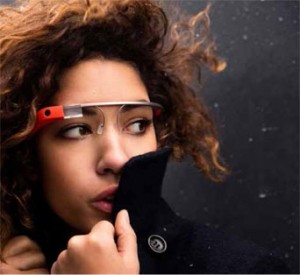By Paddy Kamen
 There’s little doubt that Google Glass is amazing, but does it place the wearer and those around her at risk?
There’s little doubt that Google Glass is amazing, but does it place the wearer and those around her at risk?
What is it?
Google Glass is a wearable computer system: an eyeglass-style frame with a wireless computer attached, complete with camera and microphone. It was recently released in beta version to a select group of people. It can be worn without lenses or with them, and Google is apparently in discussion with several eyeglass manufacturers about models for people with vision correction needs. The computer sits on the right temple and the visual display and camera on the right upper lens area.
What’s Amazing About it?
Glass provides a translucent viewing screen just above the wearer’s field of vision, so you can see data and visuals projected, while still being able to see through it. So, for example, the screen could act as a GPS while you are driving, it can project information about your flight departure time while you’re on the way to the airport, or let you know where you can find a grocery store nearby.
The device is voice activated. In the video released by Google[1], wearers say to the device, ‘O.K. Glass… what is the temperature?’ or ‘take a picture’, or ‘where am I?’ But, like a smart phone, Google Glass also pushes data that it thinks you want.
Glass can also be used as a camera that films whatever is in front of you so you can participate in the action, while sharing it live with friends and also recording it for later viewing.
How is it Scary?
Steve Mann is known as the father of computer vision systems. The University of Toronto professor of electrical and computer engineering created his first computerized vision system when he was still in high school back in the 1970s. He has continued to invent in the field and wears his own device, which is more sophisticated than Google Glass, most of the time.
Mann has some interesting things to say about Glass in an article on the IEEE Spectrum site.[2] He writes:
My concern comes from direct experience. The very first wearable computer system I put together showed me real-time video on a helmet-mounted display. The camera was situated close to one eye, but it didn’t have quite the same viewpoint. The slight misalignment seemed unimportant at the time, but it produced some strange and unpleasant results.
And those troubling effects persisted long after I took the gear off. That’s because my brain had adjusted to an unnatural view, so it took a while to readjust to normal vision.
He goes on to identify other possible effects on vision:
These systems all contain lenses that make the display appear to hover in space, farther away than it really is. That’s because the human eye can’t focus on something that’s only a couple of centimeters away, so an optical correction is needed. But what Google and other companies are doing – using fixed-focus lenses to make the display appear farther away – is not good.
Using lenses in this way forces one eye to remain focused at some set distance while the focus of the other eye shifts according to whatever the wearer is looking at, near or far. Doing this leads to severe eyestrain, which again can be harmful, especially to children.
Dr. Ralph Chou, Professor Emeritus at the University of Waterloo’s School of Optometry, has concerns about the attentional capacity of Google Glass wearers.
“I wonder if you would have the same kind of attention deficit using this device when driving as you would when texting or phoning. Also, if you are locked into looking at an image within part of your field of view, will you be paying attention to whatever else is in front of you? Under the best conditions most will have difficulty attending to what they are doing while accessing extraneous information on the fly. I can see this as a useful device for certain things but the big ‘but’ is, how safe would you be to navigate a car, walk, or ride a bicycle where you have to be aware of your surroundings.”
And, while not exactly scary, there’s also the question of how plugged in a person really needs to be. When asked if he would like to try Glass, Chou responded: “Personally it holds no attraction for me, as I don’t feel the need to be plugged in all day long. But I can think of some more tech-savvy friends who might love it.”







